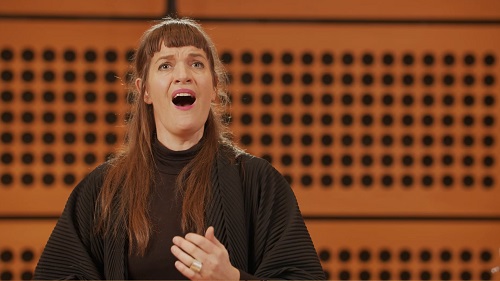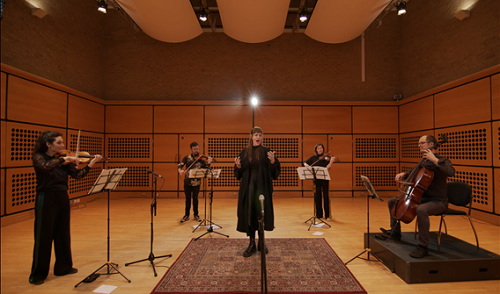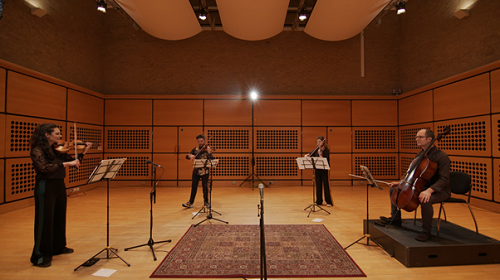“This music builds so much adrenaline that you feel you have to let that out at the end!” With a smile and a giggle, violinist Rakhi Singh, co-founder of the Manchester Collective, welcomed the online audience to the ensemble’s live-streamed concert in the Djanogly Recital Hall at Nottingham Lakeside Arts.
Together with violinist Donald Grant, viola player Ruth Gibson and cellist Nick Trygstad, Singh has just danced through the busy sonic interplay of Caroline Shaw’s Valencia, a work of constantly, almost imperceptibly, shifting textures and timbres. From fleet, floaty fragments to punchy, pungent pizzicatos, from drone-like glissandi to glistening snatches of soaring song, this is a work in which the musical conversations never stop. The Manchester Collective relished the intimate and ensemble exchanges, creating a really engaging spontaneity and fluidity – all surging bows, dry left-hand pizzicato-snaps, resounding and ringing joyfully towards the close. No wonder they were grinning at the end.
More than that, this was the Collective’s first live performance since March last year, and the first time that they had collaborated with the soprano Ruby Hughes. The occasion clearly meant much to them all. There was no downloadable programme; instead, the musicians introduced the works themselves, and the revelation of their personal responses to the eclectic array of musical works that they had chosen to perform really did close the ‘gap’ between ‘them and us’.

If the programme was eclectic there were, however, running threads: exile and loss, spirituality and transcendence. Two laments by the Renaissance Catholic exile, John Dowland, established a mood of stillness and sadness. Presumably ‘Go Crystal Tears’ and ‘Flow my Tears’ were performed in an arrangement of the version that was commissioned by the Australian Chamber Orchestra from composer David Bruce. The performers took a little while to settle, but the soft reediness of the low con sordino strings created a timeless quality and beautifully set off the lightness and clarity of Hughes’ soprano. “Go crystal tears, like to the morning show’rs/ And sweetly weep into thy lady’s breast,” she uttered, with almost tragic tenderness, the final syllable floating and fading, seeming to vanish, to slip out of time, and then gently re-emerge. I was intrigued by some unexpected melodic shadings – sharpenings of the degrees of the minor mode when I expected flattening, particularly in the repeated final couplet of each stanza – but they only served to intensify. The initial elaboration by the strings of Dowland’s counterpoint was followed in the second stanza by a sparser string canvas, before gathering energy pushed forwards, only to be interrupted by a harmonic turn, allowing the cello’s slow, falling steps to guide all towards the close.
‘Flow my tears’ began with some searching first violin melodising, which Singh passed to cellist Nick Trygstad, freeing her to slither downwards in scales like tumbling tears while Donald Grant’s violin proffered lute-like pizzicato arpeggiated chords in support. Embellishing trills, strong cello pizzicatos, and the viola’s eloquent circling around the vocal line, especially at the cadences, evoked the busyness and diversity of a responsive lute. Hughes added a little weight to her soprano for this song and the music gained momentum, only to be halted by a sudden shock of silence before the final stanza, and Hughes’ whispered plea, “Hark! you shadows that in darkness dwell,/ Learn to condemn light.”

Three of John Tavener’s settings of Anna Akhmatova followed, sustaining the spirit of exile. In her ode to Dante, the Russian poet likens her literary evocation of Soviet Russia to the Italian poet’s portrait of Hell. Her soprano now strong and true, Hughes’ communicated the austere beauty of Tavener’s setting, conversing lyrically with the cello’s modally tinted melodic arches against sustained notes in the other strings. The apparent simplicity was belied by the concentration of the musicians’ focus. The ode to Boris Pasternak had a wonderfully ‘innocent’ purity and Ruth Gibson’s viola countermelody was an absolute balm for the soul. Gruff aggression from the cello initiated a rising round of indignation in ‘Couplet’, the terse succinctness of the song emphasising the unapologetic assertiveness of Hughes’ forthright articulation of Akhmatova’s dismissal of praise.
Ravel’s Kaddish, from the Deux Mélodies Hébraïques, continued the lamentation and spiritual journey, and also the eastern modality which tinges Tavener’s songs. The string textures were a scintillating bouquet of colour and scent, all pizzicatos, tremolos and sul ponticello shimmers. Hughes’ soprano was unwaveringly warm and full, and the vocal phrases expanded with persuasive flexibility; she showed a tremendous and innate appreciation of the rhythms of the French text, and pushed forwards compellingly to the exultation of the final “Amen”, which releases the soul into the afterlife. This is a good ‘fit’ for a string quartet, the C minor tonality naturally creating a consoling finality when the cello drops from the third degree to the tonic in the last bar.
After the release of the soul from the body, and the confirmation of human belief in God’s divinity, came what might seem to be a portrait of the soul in heaven. As Singh explained, the Cavatina from Beethoven’s String Quartet in B flat Op.130 “challenges you to see how much of your heart can you put into every note”. The Collective certainly met that challenge: tremendously tender warmth emanated from the music, replenishing with its lovely sweetness.

Three Scottish tunes took the concert on a turn in a different direction. Second violinist Donald Grant grew up in the Highlands of Scotland, the son of a Gaelic singer and teacher. Alongside his classical music-making (he was formerly a violinist in the Elias String Quartet) he is a fiddle player, and he led the Collective in an intense rendition of his own arrangement of ‘Da Day Dawn’ which, he explained, hails from the Shetland Isles and is thought to be the oldest Scottish tune for which there is a record. The still concentration that had marked so much of the musicians’ performance thus far continued here; occasionally the inner energy accrued and burst through, only to burn itself out and retreat. Donald Shaw’s arrangement of ‘Calum’s Road’ followed, the melody emerging – like the eponymous Raasay lighthouse keeper’s road – slowly but surely. A relaxed smile and tight-shut eyes suggested that Grant was transported ‘elsewhere’ by his relaxed melodic meanderings, but his tapping foot brought him back to the present as the song segued into a Reel that Grant composed as a 70th-birthday gift for a friend. Exuberant and joyful, it closed with some well-earned “Yeahs!”.
Ruby Hughes rejoined the Collective for Jake Heggie’s arrangement (made for Joyce DiDonato in 2017) of Debussy’s Trois Chansons de Bilitis. There was a lovely freshness and sense of discovery in ‘La flûte de Pan’ with violin and voice in dialogue and inner energies swirly in the ever-changing accompanying textures. Once again, Hughes’ French diction was superb; her phrasing had a lovely freedom. ‘La chevelure’ was a sensuous blend of voice and strings, building towards the climaxes of Pierre Louÿs’ erotic imagery – “nous étions liés pour toujours ainsi, par la mêmes chevelure” (we were united thus for ever by the same tresses, mouth on mouth) – but it was an appropriately dream-like ecstasy.
The performance closed with spiritual transfiguration: ‘Urlicht’ from Mahler’s Resurrection Symphony. Hughes’ solemn song was nevertheless opulent and intense, the simple rising intervals aspiring hopefully, lifting us towards the celestial lights above.
This was, as I’ve said, the first collaboration between Ruby Hughes and the Manchester Collective. It was originally planned as a large-scale touring project which, like so many plans, fell victim to the pandemic. But, the Chief Executive of the Collective, Adam Szabo, promises that it won’t be the last such collaboration: two major projects are currently in production, ‘one of them wholly digital and quite unlike anything we’ve ever made before.’ At a time when good news is short on the ground, that’s excellent to learn.
This concert is available on demand until Sunday 28th February inclusive.
Claire Seymour
Ruby Hughes (soprano), Manchester Collective (Rakhi Singh – violin, Donald Grant –violin, Ruth Gibson – viola, Nick Trygstad – cello)
Shaw – Valencia, Dowland – Two Laments; Tavener – Akhmatova Songs (selections), Ravel – Kaddish, Beethoven – Cavatina from String Quartet in B flat Op.130, Debussy (arr. Heggie) – Trois Chansons de Bilitis, Mahler – ‘Urlicht’ from Symphony No.2, Trad. – 3 Scottish Tunes (arr. Donald Shaw & Donald Grant).
Djanogly Recital Hall, Nottingham Lakeside Arts (live stream); Sunday 21st February 2021.
ABOVE: Ruby Hughes (soprano) and the Manchester Collective